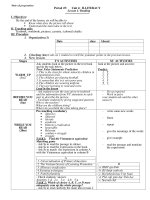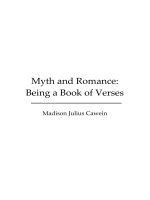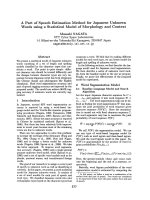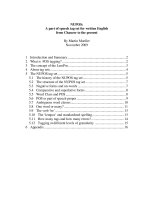Unit 5 being a part of asean
Bạn đang xem bản rút gọn của tài liệu. Xem và tải ngay bản đầy đủ của tài liệu tại đây (998.76 KB, 16 trang )
UNIT 5: BEING A PART OF ASEAN
(TRỞ THÀNH MỘT PHẦN CỦA ASEAN)
A. VOCABULARY
New words
assistance
Meaning
sự giúp đỡ
/əˈsɪstəns/ (n)
Picture
Example
Viet
Nam
assistance from
member states.
received
ASEAN
Việt Nam được nhận trợ giúp
từ các quốc gia thành viên
ASEAN.
association
hội, hiệp hội
/əˌsəʊsiˈeɪʃn/ (n)
The aim of the association is
to
promote
friendship
among the ten countries.
Mục đích của hiệp hội là thúc
đẩy tình hữu nghị giữa mười
quốc gia.
bend
uốn cong
/bend/ (v)
They bend their fingers to
the music.
Họ uốn ngón tay theo điệu
nhạc.
benefit
lợi ích
/ˈbenɪfɪt/ (n)
This activity brought a lot
of benefits to the local
people.
Hoạt động này mang lại
nhiều lợi ích cho người dân
địa phương.
bloc
/blɒk/ (n)
khối
A bloc is a group of
countries, parties, or groups
sharing a common purpose.
Khối là một nhóm các quốc
gia, đảng hoặc các hội nhóm
có cùng chung mục đích.
charm
sự quyến rũ
/tʃɑːm/ (n)
If you visit my country, you
won't resist its charms.
Nếu bạn đến thăm đất nước
tôi, bạn sẽ không thể cưỡng
lại được sự quyến rũ của nơi
này.
charter
hiến chương
/ˈtʃɑːtə(r)/ (n)
The Charter is a legal
agreement among the ten
ASEAN member states.
Hiến chương là một hiệp định
hợp pháp giữa mười quốc gia
thành viên ASEAN.
constitution
hiếp pháp
/ˌkɒnstɪˈtjuːʃn/ (n)
As the constitution of
ASEAN,
the
Charter
establishes the rules for
closer cooperation among
the member states.
Hiến chương là hiến pháp
của ASEAN nhằm thiết lập
các quy tắc hợp tác chặt chẽ
hơn giữa các quốc gia thành
viên.
delicate
/ˈdelɪkət/ (n)
mềm mại, thanh
nhã
It is the delicate gestures
that make this folk dance
become special.
Chính những động tác tinh tế
đã khiến điệu nhảy dân gian
này trở nên đặc biệt.
economy
/ɪˈkɒnəmi/ (n)
nền kinh tế
ASEAN
focuses
on
improving member states'
economies.
ASEAN tập trung cải thiện
nền kinh tế của các quốc gia
thành viên
elongated
thon dài
/ˈiːlɒŋɡeɪtɪd/ (adj)
The Socialist Republic of
Vietnam has a shape of
elongated S.
Nước Cộng hòa xã hội chủ
nghĩa Việt Nam có hình chữ S
thon dài.
external
ở ngoài, bên
One of the main principles
/ɪkˈstɜːnl/ (adj)
ngoài
of the ASEAN Charter is
the "Right to live without
external interference".
Một trong những nguyên tắc
chính
của
Hiến
chương
ASEAN là "Quyền sống mà
không có sự can thiệp từ bên
ngoài".
govern
cai trị, nắm
/ˈɡʌvn/ (v)
quyền
The new president needs
popular support to govern
effectively.
Tổng thống mới cần sự ủng
hộ đa số để cai trị hiệu quả.
graceful
duyên dáng
/ˈɡreɪsfl/ (adj)
Lamvong is a fast moving,
but graceful social dance.
Lăm Vông là một điệu nhảy
tập thể nhanh mà duyên
dáng.
identity
bản sắc
/aɪˈdentəti/ (n)
Every country has its own
cultural identity.
Mỗi quốc gia có một bản sắc
văn hóa riêng.
infectious
/ɪnˈfekʃəs/ (adj)
lây nhiễm
It was an infectious disease
that caused many deaths in
this country.
Đó là một căn bệnh truyền
nhiễm gây ra nhiều ca tử
vong tại quốc gia này.
interference
sự can thiệp
/ˌɪntəˈfɪərəns/ (n)
They
don't
allow
any
interference
with
the
development
of
the
organization.
Họ không cho phép bất kỳ sự
can thiệp nào đối với sự phát
triển của tổ chức.
legal
/ˈliːɡl/ (adj)
(thuộc) pháp lý,
hợp pháp
The Charter has become a
legal agreement among the
ten countries since 2008.
Hiến chương đã trở thành
một hiệp định hợp pháp giữa
mười quốc gia từ năm 2008
motto
phương châm,
The motto of the bloc is:
/ˈmɒtəʊ/ (n)
khẩu hiệu
"One Vision, One Identity,
One Community".
Phương châm của khối là:
"Một tầm nhìn, Một bản sắc,
Một cộng đồng".
principle
nguyên tắc
/ˈprɪnsəpl/ (n)
They have to follow these
fundamental principles.
Họ phải tuân theo những
nguyên tắc cơ bản này.
stability
/stəˈbɪləti/ (n)
sự ổn định
The main goal of this
association is to maintain
regional peace and stability.
Mục tiêu chính của hiệp hội
này là gìn giữ hòa bình và ổn
định khu vực.
solidarity
tình đoàn kết
/ˌsɒlɪˈdærəti/ (n)
Young
people
share
information and experience,
which promotes solidarity
and mutual understanding
among them.
Những người trẻ chia sẻ
thông tin và kinh nghiệm,
giúp thúc đẩy tình đoàn kết
và sự thấu hiểu lẫn nhau.
symbolize
biểu tượng, tượng
/ˈsɪmbəlaɪz/ (v)
trưng hóa
White symbolizes purity.
Màu trắng tượng trưng cho
sự thuần khiết.
B. GRAMMAR
I. GERUNDS (DANH DỘNG TỪ)
1. Định nghĩa
Danh động từ là hình thức động từ thêm đuôi "ing", có chức năng như danh từ.
2. Chức năng
Danh động từ thường được dùng để:
- Làm chủ ngữ trong câu:
E.g: Doing exercise regularly is very good for our health.
- Làm tân ngữ đứng sau một số động từ: avoid, appreciate, admit, consider, deny, detest, enjoy, fancy,
mind, finish, imagine, resume, forgive, practice, resent, keep, tolerate, risk, postpone, suggest,
miss...
E.g: He practices speaking English every day.
- Làm tân ngữ đứng sau một số cụm từ: it's (not) worth..., it's (no) use/ good..., in addition to, can't
help, can't bear, can't stand...
E.g: It's worth buying an expensive ticket to this concert.
- Đứng sau các cụm động từ (phrasal verbs): give up, put off, keep on, be opposed to, face up to, be
against, look forward to, be interested in, be/get used to, see about, care for...
E.g: I get used to getting up early.
Một số cấu trúc:
* V + O/ tính từ sở hữu + Ving
Những động từ hay gặp trong dạng này là appreciate, detest, (dis)approve of, (dis)like, hate, love, object
to, forget, imagine, remember, think of, resent, recall
Eg:
I appreciate him looking after me so well.
I appreciate his looking after me so well, (more formal)
Lưu ý: Chúng ta chỉ sử dụng hình thức sở hữu khi nói về người và chúng ta cũng không sử dụng hình
thức sở hữu nếu tân ngữ phức tạp.
E.g:
I remember the horse winning the race. (the horse là tân ngữ chỉ vật)
I like Peter and his sister showing me around. (không nói Peter's and his sister's)
*V + to V/Ving
Những động từ hay gặp là start, begin, not bother, cease, continue
E.g: I started to do/ doing the test.
* V + giới từ (prep) + Ving
a. Giới từ to
Những động từ hay gặp là adapt, adjust, admit, look forward, own up, resort, confess, object
E.g: I look forward to seeing him.
b. Giới từ by
Những động từ hay gặp là begin, close, end, finish (off/up), open, start (off/ out)
E.g: Can you begin by doing the housework?
c. giới từ on
Những động từ hay gặp là concentrate, count, depend, focus, insist, rely
E.g: I concentrate on doing the exercise.
d. Giới từ of
Những động từ hay gặp là approve, hear, know, speak, talk, tell
E.g: Have you ever heard of (anyone) getting arrested for gossiping before?
e. Giới từ from trong cấu trúc V + O + from + Ving
Những động từ hay gặp là deter, discourage, keep, prevent, prohibit, stop
E.g: The storm prevented us from going camping.
* V (feel, hear, notice, observe, overhear, see, watch) + Ving/V (bare-inf)
E.g: I heard him singing a song. (Ving để chỉ hành động đang tiếp diễn người nói chỉ biết được một
phần của hành động)
I heard him sing a song. (bare-inf để chỉ hành động đã hoàn tất người nói biết được toàn bộ hành
động)
* V (dare/ help) + V bare-inf/ to V
E.g: I dare (to) say goodbye to him.
Nếu sau dare có tân ngữ thì chúng ta chỉ dùng to V
E.g: I dared her to cross the river.
* V (make, have, let) + O + V bare-inf
E.g: I let my son go out with his friends.
* V + O + to V
Những động từ thường gặp là advise, allow, believe, cause, command, enable, encourage, force, invite,
order, persuade, remind, show, teach, tell, warn
E.g: I advised him to stop smoking.
* V + to V
Những động từ thường gặp là decide, agree, consent, fail, hope, manage, offer, pretend, refuse, start,
threaten, volunteer, guarantee
E.g: I hope to see you soon.
She decided to move here.
* V + prep + O + to V
a. Giới từ for
Những động từ thường gặp là advertise, arrange, apply, campaign, plan, wait
E.g: I arranged for Linda to stay in New York.
b. Giới từ at
Những động từ thường gặp là go on, keep on, scream, shout, yell
E.g: He shouted at the girl to open the door.
c. Giới từ on
Những động từ thường gặp là count, depend, prevail, rely
E.g: I depend on you to find the best solution.
d. Giới từ to
Những động từ thường gặp là appeal, gesture, motion, signal
E.g: She signalled to the man to open the windows.
Note:
Một số động từ có thể đi cùng với cả động từ nguyên thể có "to" và V-ing, nhưng có sự khác nhau về ý
nghĩa:
Stop V-ing: dừng làm gì (dừng hẳn)
Stop to V: dừng lại để làm việc gì
- Stop smoking: dừng hút thuốc
- Stop to talk: dừng lại để nói chuyện
Remember/forget/regret to V: nhớ/quên/tiếc sẽ phải làm gì (ở hiện tại - tương lai)
Remember/forget/regret V-ing: nhớ/quên/hối tiếc đã làm gì (ở quá khứ)
E.g: I regret to inform you that the train was cancelled. (Tôi rất tiếc phải báo tin cho anh rằng chuyến tàu
đã bị hủy.)
- She remembers seeing him. (Tôi nhớ đã gặp anh ấy.)
Try to V: cố gắng làm gì
Try V-ing: thử làm gì
E.g: I try to pass the exam. (Tôi cố gắng vượt qua kỳ thi.)
- You should try wearing this hat. (Bạn nên thử đội chiếc mũ này.)
Prefer V-ing to V-ing
Prefer + to V + rather than (V)
E.g: I prefer staying at home to going out.
- I prefer to stay at home rather than go out.
Mean to V: Có ý định làm gì.
Mean V-ing: Có nghĩa là gì.
E.g: He doesn't mean to prevent you from doing that. (Anh ấy không có ý ngăn cản bạn làm việc đó.)
- This sign means not going into. (Biển báo này có ý nghĩa là không được đi vào trong.)
Need to V: cần làm gì
Need V-ing: cần được làm gì (= need to be done)
E.g: I need to clean the house.
- Your hair needs cutting. (= Your hair needs to be cut.)
Used to V: đã từng/thường làm gì trong quá khứ (bây giờ không làm nữa)
Be/Get used to V-ing: quen với việc gì (ở hiện tại)
E.g: I used to get up early when I was young. (Tôi đã từng dậy sớm khi còn trẻ.)
I'm used to getting up early. (Tôi quen với việc dậy sớm rồi)
Advise/ recommend /allow/permit + O + to V: khuyên/cho phép ai làm gì.
Advise/ recommend /allow/permit + V-ing: khuyên/cho phép làm gì.
E.g: They don't allow us to go out.
- They don't allow going out.
- We are allowed to go out. (bị động)
■ BÀI TẬP VẬN DỤNG Cơ BẢN
Bài 1: Decide if the Gerund in the following sentences used as a subject, object or as a complement?
1. Swimming is great fun.
2. She hates staying out at night.
3. Fishing is my hobby.
4. Smoking is bad for your health.
5. Do you enjoy cooking?
6. Climbing can be dangerous.
7. Doing housework is boring.
8. My favourite activity is using my computer.
9. Why don't you like ironing?
10. What he really likes is going on foot.
Bài 2: Choose the best answer in brackets.
1. Remember (checking/ to check) your answer before handing in your exam paper.
2. I remember (putting/ to put) the money in the top drawer, but it's not there now.
3. He needs (working/ to work) harder if he wants to make progress.
4. It's difficult problem. It needs (thinking/ to think) about very carefully.
5. I think Nam meant (breaking/ to break) that glass. It didn't look like an accident.
6. If we want to get there by 7.00, that means (getting/ to get) up before 5.00.
7. Can you help me (getting/ to get) the dinner ready?
8. He looks so funny. Whenever I see him, I can't help (smiling/ to smile).
9. I advise (taking/ to take) more exercise.
10. I'd advise you (taking/ to take) more exercise.
Bài 3: Choose the best answer to complete the sentences.
1. It was very dangerous. We couldn't risk__________her alone.
A. leave
B. leaving
C. to leave
D. left
C. repairing
D. repair
C. to stay
D. stayed
2. I had the roof__________yesterday.
A. to repair
B. repaired
3. We let our son__________up late at weekends.
A. staying
B. stay
4. The children were eager__________their parents.
A. to see
B. see
C. seeing
D. saw
C. stayed
D. stay
5. He'd rather__________at home.
A. to stay
B. staying
6. Nam is very humorous. His joke makes me__________a lot.
A. laugh
B. to laugh
C. laughing
D. laughed
C. to signing
D. signed
7. They saw him__________the agreement.
A. sign
B. to sign
8. It's necessary for her__________back home before 10 p.m.
A. coming
B. come
C. came
D. to come
9. They would__________go to Ho Chi Minh City by plane than travel by train.
A. like
B. rather
C. prefer
D. better
C. us going
D. us to going
C. meeting
D. to meeting
C. bought
D. buying
C. dividing
D. divide
10. The boss allows__________going home early.
A. us to go
B. us go
11. 1 remember__________him in London.
A. meet
B. to meet
12. He avoids__________underwear at that shop.
A. buy
B. to buy
13. The girls agreed__________the cake equally.
A. to be divided
B. to divide
14. She expected__________for the job, but she wasn't.
A. to select
B. selected
C. selecting
D. to be selected
15. David finished__________his homework and then he went to the party with George and Bill.
A. do
B. to be done
C. to do
D. doing
16. Please don't forget__________the baby. She needs to eat every two hours.
A. feeding
B. fed
C. to feed
D. to be fed
C. you come
D. you to come
17. Mr.Tim wants__________to his office.
A. that come
B. you coming
18. What about__________for a walk?
A. go
B. going
C. to go
D. gone
19. __________at the audience, the contestant gave her answer with confidence.
A. Looking
B. To look
C. Have look
D. Look
C. have stolen
D. stolen
C. have moved
D. move
20. The thief admitted__________the money.
A. to steal
B. stealing
21. She decided__________to Ho Chi Minh city.
A. to move
B. moving
22. We are very happy about your__________all the assignments before the deadline.
A. being completed
B. completed
C. having completed
D. to complete
23. __________all the rules of chess, the contestants started to play the first game.
A. Learn
B To learn
C. Had learned
D. Having learned
C. read
D. to having read
C. seeing/ to cry
D. seeing/ cry
24. He had better__________this book again.
A. to reading
B to read
25. I hate__________a child__________.
A. see/crying
B. see/ cry
26. The police accused him of__________fire to the building but he denied__________in the area on the
night of the fire.
A. setting/ be
B. setting/ having been
C. set/ be
D. set/ having been
27. Passing the kitchen, he stopped__________a larqe qlass of water.
A. to drink
B. drink
C. drinking
D. to drinking
28. They stopped__________when the teacher came in.
A. talk
B. to talk
C. talking
D. to talking
29. I regret__________you that the model you want is out of stock.
A. tell
B. to tell
C. telling
D. to telling
30. I didn't regret__________a year travelling around the world.
A. spend
B. to spend
C. spending
D. to spending
Bài 4: Put the verbs in the brackets in the correct form.
1. We encouraged him__________ (succeed in) __________ (become) a top player.
2. It's no good__________ (force) her to go with us.
3. I promised__________ (care) for the dog but I'm not much good at__________ (babysit).
4. The people thanked me for__________ (offer) __________ (help) them.
5. He begged her __________ (not accuse) him of __________ (ruin) her hairstyle by__________ (try)
__________ (kiss) her.
6. It is not worth__________ (help) her__________ (do) the job.
7. I let my son__________ (choose) between__________ (fly) and__________ (take) the train.
8. The film was really worth__________ (see) so we made Daisy__________ (go) to the movies with us.
9. He forced us__________ (accept) his offer by__________ (raise) it by 10%.
10. Normally I enjoy__________ (go) out but today I'd prefer__________ (stay) indoors.
11. His wife promised__________ (not object) to his__________ (smoke).
12. We continued__________ (eat) after the interruption.
13. I am not in the habit of__________ (smoke) in the office.
14. Mary reminded me__________ (finish) my work on time.
15. He'd better__________ (get) used to__________ (work) harder.
16. lam capable of__________ (stand) on my head and__________ (play) the saxophone.
17. You'd better__________ (start) digging the garden.
18. I expected him__________ (pick) up these papers.
19. The Romans were quite happy about Hannibal__________ (not attack) Rome.
20. It was interesting__________ (watch) my cat__________ (play).
II. STATE/ STATIVE VERBS (ĐỘNG TỪ CHÌ TRẠNG THÁI)
1. Định nghĩa
Động từ chỉ trạng thái (State verbs) mô tả 1 trạng thái hay tình trạng mang tính ổn định, không thay đổi và
kéo dài trong một thời gian nhất định. Động từ chỉ trạng thái thường không được dùng trong thì tiếp diễn.
E.g: I know that ASEAN is an organization which consists often countries located in Southeast Asia.
2. Các động từ chỉ trạng thái phổ biến
- Các động từ chỉ quan điểm, nhận thức: believe, think, know, remember, doubt, guess, regret, realise,
understand
- Các động từ bảy tỏ tâm trạng, cảm xúc: like, hope, prefer, want, wish, desire, seem, feel
- Các động từ tri giác: see, smell, hear, taste, sound
- Các động từ khác: be, have, consist, belong, concern, depend, deserve, include, matter, own, owe
Các động từ không thể hiện trạng thái gọi là action verbs, thường mang nghĩa 1 hành động Tuy nhiên, có
một số động từ trạng thái đôi khi được dùng ở dạng tiếp diễn để mô tả một tình huống tạm thời hoặc một
điều gì đó xảy ra ở một thời điểm xung quanh hiện tại. Một số động từ vừa là động từ chỉ trạng thái (state
verbs) vừa là động từ chỉ hành động (action verbs) phụ thuộc vào nghĩa của chúng.
- think
I think that he is a good person. (Tôi nghĩ rằng anh ấy là một người tốt.) "think" là "state verb":
có ý nghĩ nào đó
I am thinking about my next summer holiday. (Tôi đã nghĩ về kì nghỉ mùa hè sắp tới của mình.)
"think" là "action verb": suy nghĩ, xem xét trong đầu (mental process)
- have
I have two big houses. (Tôi có hai ngôi nhà lớn.) "have" là "state verb": có, sở hữu (= own,
possess)
I am having lunch with my friend. (Tôi đang ăn trưa với bạn.) "have" là "action verb" (= eat)
- see
I see what you mean. (Tôi hiểu ý của bạn.) "see" là "state verb": hiểu (= understand)
I am seeing my boyfriend. (Tôi đang đi gặp bạn trai tôi.) => "see" lờ "action verb": gặp gỡ (= meet)
■ BÀI TẬP VẬN DỤNG CƠ BẢN
Bài 5: Decide whether the following English verbs are action verbs, state verbs, or can be both
action and state verbs.
enjoy __________
play __________
read __________
burn __________
weigh _________
matter __________
feel __________
measure _________
mind __________
contain __________
prefer _________
agree __________
smell __________
look __________
hear __________
worry __________
Bài 6: Decide whether the following sentences are correct or incorrect.
1. Are they having a wonderful time? __________
2. I am thinking you are a good person. __________
3. It is tasting good. __________
4. You are looking great. __________
5. He's been working since this morning. __________
6. He's having a big house. __________
7. The food tastes good. __________
8. They are looking at the photo album. __________
9. They are designing a robot. __________
10. She is liking him very much. __________
Bài 7: Choose the best answer in brackets to complete the following sentences.
1. Do you__________the answer? (depend on, know, include)
2. Tom__________dessert every day. (has, eats, possesses)
3. I__________good about the race's outcome, (am, were, feel)
4. She__________her father, (imagines, resembles, walks with)
5. Do you__________they will win? (think, involve, promise)
6. They really__________everything you did for them, (include, appreciate, dislike)
7. I think the examiner was__________with my speech, (involved, measured, satisfied)
8. Can you__________the coffee brewing? (feel, smell, dislike)
9. I still__________a lot of money on my student loans, (deserve, owe, involve)
10. You__________more shoes than anyone else I know! (dislike, suppose, have)
Bài 8: Put the verbs into the present simple or present continuous tense.
1. I__________ (know) the answer.
2. The boy __________ (look) at the TV now.
3. This cake__________ (taste) delicious.
4. My father__________ (not, own) a car.
5. I__________ (wear) a blue sweater today.
6. Ann __________ (seem) a little angry today.
7. Many people__________ (do) yoga in the park right now.
8. He__________ (think) that English is easy.
9. Kelly__________ (love) my brother now.
10. My sister__________ (not/talk) on the phone at the moment.
■ BÀI TẬP VẬN DỤNG NÂNG CAO
Bài 9: the verbs in the brackets in the correct form.
1. We have taught our children__________ (wash) their hands before__________ (eat).
2. __________ (write) letters is more boring than__________ (phone).
3. Mark decided__________ (have) a break from work.
4. I refused__________ (speak) with her.
5. We agreed__________ (meet) him at the airport.
6. There is no sense in__________ (earn) more money than you can__________ (spend).
7. They made us__________ (leave) the campsite after__________ (make) such a mess.
8. Do you mind__________ (work) overtime?
9. She doesn't how__________ (fry) a steak.
10. The doctor made him __________ (promise) __________ (reduce) his __________ (smoke).
11. Don't let them__________ (cross) that dangerous road on their own.
12. What about__________ (have) a drink?
13. They accused him of__________ (break) the window.
14. They'd rather__________ (go) to Hue than to Hanoi.
15. There was a very good reason for__________ (not believe) in what she said.
16. I don't know what__________ (believe) anymore.
17. Remember__________ (phone) Sally tomorrow - OK I won't forget.
18. Most teachers insist on their students__________ (do) the homework.
19. Why not__________ (spend) our holiday in Da Lat this year?
20. She is always the last person__________ (arrive).
Bài 10: Choose a correct preposition that goes with the verb at the end of the sentence and put them
into the gaps.
1. We decided__________the event to another country. It just wouldn't work. (move).
2. Why couldn't you prevent your dog__________my steak? (eat)
3. What are the advantages__________a house (buy)?
4. Forget__________Jenny to come with US. She's with Tom this weekend (ask)
5. To start writing good essays you have to begin__________ideas and sorting them. (collect)
6. She tried to talk me__________to the party with her, but I didn't want to. (come)
7. I must rely__________you__________me the truth, (tell)
8. I am looking forward__________my daughter, (see)
9. I can't understand why people don't refrain__________. It's so bad for your health. (smoke)
10. You can't blame me__________the bus. (miss)
11. You have a choice__________with us and__________at home, (come, stay)
12. The firemen prevented the fire__________to the other buildings, (spread)
13. I am not interested__________to your stories, (listen)
14. The headmaster gave us the opportunity__________what we had achieved, (explain)
15. Please let me apologize__________so impolite to you. (be)
16. Can you eat an apple__________your hands? (use)
17. Many young girls dream__________a model, (become)
18. We thought__________to another place next month, (move)
19. The young man was charged__________goods over the border, (smuggle)
20. Please concentrate__________all the vocabulary in your book, (learn)
21. The teacher insisted__________to my parents, (speak)
22. He thanked us__________him in so late at night .(let)
23. The manager succeeded__________the deal, (make)
24. The group of technicians specialize__________on difficult problems, (work)
25. If I were you I wouldn't brag__________four girls in one week, (date)
Bài 11: Rewrite the following sentences.
1. You can try to get Jim to lend you his car, but you won't succeed.
There's no point ____________________.
2. He wished he had invited her to his birthday party.
He regretted ____________________.
3. Mastering a second language takes time and patience.
It ____________________.
4. After four years abroad, Mr. Brown returned home as an excellent engineer.
After Mr. Brown ____________________.
5. It won't be difficult to get a ticket for the game.
You won't have any ____________________.
6. Driving on the left is strange and difficult for Americans.
Americans aren't ____________________.
Bài 12: Put the verbs into the present simple or present continuous tense depending on
whether they are state verbs or action verbs.
1. This soup__________ (not/taste) delicious.
2. __________ (you/love) him?
3. Emily__________ (look) lovely in that new dress.
4. __________ (you/see) what I mean?
5. I__________ (think) I'll have a rest; I'm tired.
6. It__________ (be) really hot today.
7. She__________ (have) a bath every morning.
8. I__________ (need) some new clothes for the winter.
9. I'm afraid I__________ (not/know) the answer to the question.
10. My children__________ (not/believe) in fairy tales.
11. Jenifer__________ (see) her daughter next month.
12. __________ (want) to go the UK for our holidays.
13. My daughter__________ (enjoy) going to the zoo.
14. Why__________ (you/look) at me like that?
15. The waiter__________ (taste) the wine for US now.
16. My friends__________ (have) a good time at the moment.
17. What__________ (you/think) about Susan's new house?
18. Mary__________ (not/be) a nurse. She's a doctor.
19. I__________ (hope) the weather is good tomorrow.
20. My husband__________ (always/taste) the food while I'm cooking!
Bài 13: Choose the best answer to complete the following sentences.
1. He often helps other people. I__________he is a good man.
A. think
B. am thinking
C. have been thinking
D. had been thinking
2. I__________about this project since last spring.
A. think
B. am thinking
C. have been thinking
D. thought
3. Can you help me, please? I__________for Mr. David's office.
A. look
B. am looking
C. have looked
D. looked
4. Is that Peter over there? He__________old and tired. Is he sick?
A. looks
B. has looked
C. has been looking
D. looked
5. She__________the soup in the kitchen when the telephone rang.
A. has tasted
B. tasted
C. was tasting
D. tastes
C. has been tasting
D. was tasting
6. This soup__________good. 1 really like it.
A. is tasting
B. tastes
7. Could you call a little later? We__________dinner now.
A. are having
B. have had
C. had
D. have
8. She__________him for a long time. They are good friends.
A. knows
B. had known
C. has been knowing
D. has known
9. This bag__________a ton. There are too many books in it.
A. weighs
B. is weighing
C. weighed
D. has been weighing
10. I__________a little boy in the room. He is sleeping on the sofa.
A. am seeing
B. saw
C. see
Bài 14: Choose the underlined part that needs correction.
D. had seen
1. While Mike (A) was fixing the car, I (B) was making the supper. By six o'clock I (C) had been working
for eight hours, so I (D) was needing a good meal.
2. Simon (A) owns two different houses. He (B) likes to live in his house by the sea when the weather (C)
is good, but in the winter he (D) is preferring to live in the city.
3. I (A) don't understand state and action verbs. They (B) seem very confusing. 1 (C) am hating them,
because they (D) are driving me crazy!
4. I (A) play tennis every Tuesday. Last week, I (B) was playing (C) with Tom, a man I (D) was knowing
from work.
5. When I (A) called Lucy, she (B) watched TV; therefore, she (C) didn't want to come out with me and I
(D) went to the pub alone.
Bài 15: Complete the sentences with the suitable verbs from the box and supply the correct form of
these verbs.
look
taste
smell
see
appear
sound
hear
feel
1a. She__________different perfumes as I walked into the cosmetics department.
1b. These roses__________wonderful. Did you grow them yourself?
2a. I__________that there is too big a gap between the rich and the poor.
2b. She says she__________really good at the moment.
3a. Listen! They__________the gong for lunch. We'd better hurry.
3b. I have to say, your plan__________very interesting.
4a. I__________you're getting married.
4b. I thought I__________somebody at the door, but I must have__________things.
5a. She__________wine all yesterday afternoon.
5b. This soup__________delicious.
6a. I will__________him later today. Do you want me to give him a message?
6b. Ah! I__________her now; she's over there by the fountain.
7a. Currently she__________at the Strand Theatre in a play by Strindberg.
7b. He__________to be asleep.
8a. I__________at the newspaper when I came across this article.
8b. Let's see it. Oh yes, it__________rather interesting.









